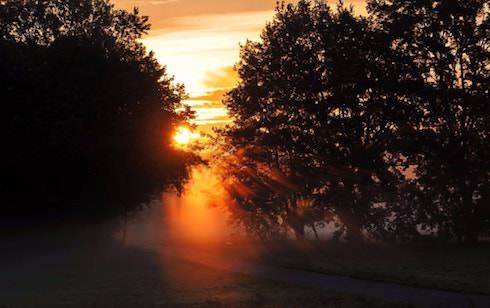 If a trouble-struck government decided to hold a plebiscite for people to choose between Light and Darkness, Light would win in a landslide. We associate light with truth, happiness, security and so much else.
If a trouble-struck government decided to hold a plebiscite for people to choose between Light and Darkness, Light would win in a landslide. We associate light with truth, happiness, security and so much else.
So when Jesus says that he is the light of the world, invites us to walk in the light and to let our light shine before people, and gives sight to Bartimaeus, he immediately attracts us. Like Bartimaeus, we want to see. We vote for light.
But later we might have second thoughts. We know that if we stare for long periods at the sun we might go blind, that in the heat of summer the light of the sun can start fires, and that if we don’t take protection against it, the sun can be the source of skin cancers.
In fact, our natural condition is to live in shadow and to protect ourselves against the light. We live in the shadow of ignorance where our attempts to find the light of truth and certainty can be destructive. We look to courts to establish the truth, but at best they can give us probability. And when public feelings are strong, court cases can destroy all those involved.
When we try to assess people’s character and fitness for office, we also work in shadow. The candidate who impresses us most can be a disaster, and we may miss the one person who could save our business. From such experiences, we learn to keep our opinions to ourselves and not to air them in the light of day.
We also live in the shadow of compromise. Our actions do not reflect the light that we see. We may be convinced that for the planet’s sake we must sell our car, forsake flying, and become a vegan. But if we are living in a family or a community we need to negotiate what we do with others who have different views. This inevitably leads to compromise. If our parish priest is difficult and bullying, too, we might believe that the right thing is to confront him. But then we reflect that to act on that will divide the parish. Even years later when we reflect back on our life we may still be unsure whether we did the right thing. So our lives are cloaked in shadow that we must respect. But the shadow also prevents us from seeing what matters and from going straight for it when we do see.
To live in the light brings many blessings. It simplifies our world. When we are camping our world becomes fragmented when the light fails. We know where our tent is, in what direction to find the path and where we stored our water. But we have little sense of the connection between these things. When the sun rises we see our world as a whole, the camp, the hills behind, the valley down to the creek and a glimpse of the path ahead.
Sunlight can also reveal the glory of a world that we can take for granted. The scrub at Anglesea can seem drab at first sight. The sunlight reveals the delicate blue of orchids, the bright red of the running postman hugging the ground and the myriad shades of green in eucalypts, wattles, heathland and on the distant hills. This is the world in which God has called each of us into being, desiring to share this gift with us.
Sunlight also draws us to attend to the variety and detail of the beauty of our world – to notice the golden ring in a tiny blue orchid, for example. It also helps us notice the changing expressions on a friend’s face, the lines on the face of a homeless person and the tension in the tram driver’s shoulders. It helps us to imagine the heat, official callousness and fear among the people despatched to Manus Island, and stirs compassion and outrage at their treatment. We recognise the glory of each human being, especially the most disregarded, and are correspondingly enraged for them when that glory is trampled on.
Jesus is God’s light that shines in the living of a human life. Contemplating him keeps us attentive to where God’s glory is held and invites us to accept the ambiguities of our world and the ambivalence of our response to it. He invites us, not to curse the darkness, but to light a candle that reflects his light.
Jesus’ instruction to let our light shine is ringing and attractive. We can imagine ourselves called to make a spectacle of ourselves with heroic action and dramatic self-presentation. And afterwards subsiding, deflated by the pinpricks of our lives. Letting our light be seen is not like carrying a generator on our back and cranking it up so that our sheer energy makes us visible. To let our light shine is simply to reflect Jesus’ light, being thankful for it, and knowing ourselves called by him with all the shadows our lives. Like Bartimaeus we are grateful that we can throw off the cloak, so revealing our sunburned faces and blotchy skin, knowing that God’s light is in us. To let our light shine is to attend to the glory of our world and so find ourselves constantly called into thankfulness.
So it is good to vote for Light, knowing that no government can provide it.
Fr Andrew Hamilton SJ is editorial consultant at Jesuit Communications.